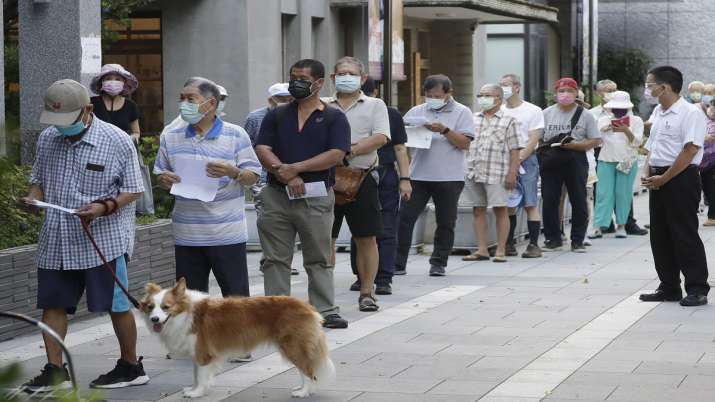
Members of the Nationalist Party, or KMT, line up to vote to elect their party’s president at a polling station in Taipei, Taiwan, on Saturday.
Taiwan’s main opposition Nationalist Party elected former leader Eric Chu as its new president in Saturday’s election, following mounting pressure from neighboring China.
Four candidates, including current president Johnny Chiang, competed for the leadership of a party that advocated closer ties with Beijing. That means agreeing to Beijing’s demand that it recognize Taiwan as part of China, something Taiwan’s ruling Democratic Progressive Party has refused to do.
China has threatened to use force to bring Taiwan under its control and has increased military, diplomatic and economic pressure in an attempt to undermine the administration of President Tsai Ing-wen and sway opinion among the Taiwanese people. , who strongly support the status quo of real freedom.
In keeping with public sentiment, nationalists have advocated for less acrimonious relations with China, rather than direct steps towards integration between the parties, which are bound by close economic, linguistic and cultural ties.
Chu ran and lost in a landslide against Tsai in 2016, before which he had served as party president and head of the region outside the capital Taipei.
He may emerge as the party’s candidate in the next presidential election in 2024, although the selection process has not yet begun. Tsai is constitutionally barred from running for a third term.
Under Chiang Kai-shek, the Nationalists rose to power in China during the 1920s and led the struggle against Japanese invaders until the end of World War II. Chiang transferred government in 1949 to Taiwan, still officially known as the Republic of China, after Mao Zedong’s Communists came to power on mainland China.
Taiwan began the transition from a martial law regime to a multi-party democracy in the 1980s and held its first direct presidential election in 1996. Since then, power has shifted between the Nationalists, also known as the KMT, and the DPP, although Tsai has won twice from Swasthya. Margin and his party have control over the national legislature.
China refuses to recognize Taiwan’s government and maintains that it is kept out of the United Nations and other international organizations.
Beijing says that the island’s participation in such roles as observer of the World Health Assembly is dependent on its support of the “one-China principle” and the “’92 consensus”, named after representatives of the Nationalists and Communists that year. It was named after an agreement reached between them. that the parties were part of a single Chinese nation.
After Tsai’s first election victory in 2016, China cut off all formal contact between governments, banned Chinese tour groups from visiting the island, and launched a campaign to address the dwindling number of Taiwan’s diplomatic allies.
With increasing frequency, China has also sent military aircraft into airspace near Taiwan and threatened military exercises.
Partly in response, the US has increased political and military support for the island, despite the lack of formal diplomatic relations between them.
Read also | Imran Khan calls Pakistan a victim of America’s ingratitude
Read also | Immediately vacate all illegally occupied areas in Kashmir: India slams Pakistan at UNGA
.